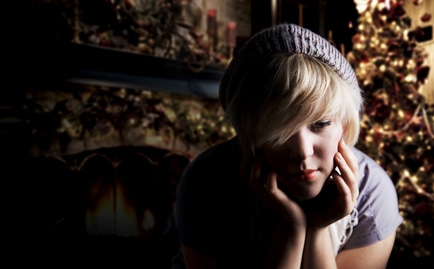
If you Google “divorce, Christmas,” you’ll find a slew of self-help articles—mostly geared toward parents. They generally boil down to something like “Five Things You Can Do to Make Christmas Easier on Your Children.” One article varies in its (very specific) angle: Five Things You Can Do to Make Christmas Less Painful for Yourself When You’re Kept Away from Your Kids for all but Four Hours on Christmas Morning.
Divorce may just be the one family struggle unavoidably exposed during the Christmas season. As we get older, we begin to see that, in all probability, a myriad of dysfunctions or just plain hard things exist for us and our families. But the expectations surrounding the holidays have power enough to keep most of the hard things cloaked and quiet. Personal discomfort, discontent and even depression can be forced down and pressed into the pits of our stomachs as we gather around the table for Christmas ham. The ramifications of divorce, however—even simply for the logistics of it—cannot go unaddressed.
My friend’s parents divorced his junior year of college. He remembers the years before the divorce—the cloud that descended on his home at Thanksgiving and lifted on December 26th. There were always so many presents bought and given; then and now they made him sick to his stomach. It was after the divorce that he, having left his mom on Christmas afternoon to spend the rest of the day at his dad’s, ran back into his mom’s house to grab the jacket he’d accidentally left behind. She sat sobbing, alone. He knew he wasn’t supposed to see her that way; the curtain of gifts and other yuletide traditions had been irrevocably pulled back.
How it worked at my own home was that my comfort and peace—my mother—would leave Christmas afternoon to go sit in a booth at McDonalds until evening. She would leave, and we would wait for my dad to ring the doorbell of the house on which he still paid the mortgage. He’d look casual, and cozy even, in his Wheaton College Dad sweatshirt, and I’d wonder how he could recline in our dusty mauve lay-z-boy each year with such ease.
It was sometime after college that my parents’ divorce and my dad’s subsequent remarriage ultimately clued me in to something perhaps obvious, but to me surreal: there are things in this life that will never be righted. It sounds so simple. But that profound sense of being stuck was like nothing I’d before experienced. I guess that despite all the mess of this world, I’d always maintained some belief the story wasn’t over—even if the story needed centuries to unfold. There was always hope.
{sidebar id=18}
But here in my family—as in so many families—there was no hope. This brokenness would never be made right or restored. Marriage. Divorce. Remarriage. The deal was done.
This realization has more than once brought me to my knees. The only thing that has even come close to reaching me in such halted hollowness is this: “For we do not know what to pray for as we ought, but the Spirit himself intercedes for us with groanings too deep for words” (Romans 8:26). I am at a loss; Jesus Christ alone can know just how deep is this loss. His Spirit is my only voice.
The truth is that Christmastime mines our losses. With many struggles, we have a choice of whether or not to ignore what we feel—even if it’s healthy to feel that way. With divorce, the choice is gone. We are stripped bare as we work out the logistics of when mom will need to be out of the house or what time we’ll be able to see our dad; everyone knows the pieces are broken.
The irony of Christmas is that it has become the primary time we’re expected to banish the chill of loss and despair. That’s what the world around us expects; that’s what we ourselves so resignedly expect. Often efforts to focus on the “true meanings” of Christmas, a movement away from raw materialism to more intangible virtues like charity and good will, merely leave us with a slightly nobler standard by which to experience the holidays.
And while it’s true that for many Christmas is an occasion to gather with family, Christmas is not a celebration of family. We’re old enough to know it’s not a celebration of gifts or lights or trees. But it’s also not a celebration of family or warmth or good cheer. After all, even gingerbread lattes get cold in about 25 minutes.
In the wintertime, the leaves fall off the trees, and I realize I can suddenly see through streets of yards and neighbors’ houses. The plush greens and golds that have hedged my vision all year long are gone; the bare branches left make for only a thin veil. I can suddenly see what’s been there all along. And maybe that’s why it’s appropriate that Christmas—and the whole Advent season—are in winter.
I will never go so far as to say that I feel lucky to know divorce—its shreddings, its whimpers, its callousness. But I know that my insides groan—as every person’s does or will for these reasons or others—and there is blessing in knowing acutely the reason I sit late on December 24th to watch and to wait. For in our brokenness we can see through the obscuring leaves of family togetherness, packages, Christmas specials and even good things like “good will” to the essence of Christmas: Christmas exists to remember the Advent of our Savior. Our Savior. Christmas is a crafted mercy, if we will allow it to be such for us, that reminds us again and again of the shipwreck and our (eventual) full rescue.




















